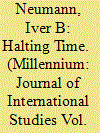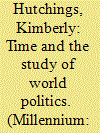|
|
|
Sort Order |
|
|
|
Items / Page
|
|
|
|
|
|
|
| Srl | Item |
| 1 |
ID:
159793


|
|
|
|
|
| Summary/Abstract |
Drawing on identity and prototype theory, the article sets out to analyse the historically dominant monumentalising ways in which polities try to shore up their own Selves by halting their Others in time. The first part of the article discusses how monuments represent Self/Other relations from ancient Mesopotamia in the East to modern Britain in the West by limning off a constitutive outside, be that as visual absence or presence. Temporality is of the essence here, with the basic idea being that the Self is in temporal motion, while the Other is literally petrified. I then postulate that the Other is halted in time in three basic ways: as visual absence, as dead and as subjugated. Crucially, however, the Second World War is actually the end point of the extraordinary stability of monumental ways in which to represent the Other. We see the tentative emergence and damning of a fourth Other, namely a previous incarnation of the Self. I conclude, with Norbert Elias, that the fading away of the Other as dead and as subjugated is significant as part of a civilisation process that works against denying the Other its future agency.
|
|
|
|
|
|
|
|
|
|
|
|
|
|
|
|
| 2 |
ID:
159792


|
|
|
|
|
| Summary/Abstract |
Recently, more and more International Relations (IR) scholars have begun to recognise time explicitly as a political phenomenon and an important element of IR theorising. Spanning different approaches and substantive concerns, their efforts suggest that IR is taking a ‘temporal turn’. This is most evident in the field’s critical wing, which has expanded our perspective on time and challenged temporalities associated with sovereign politics and mainstream theories. However, critical treatments of time also manifest four discursive habits – two targets of criticism and two alternatives – that reproduce hidden tensions and contradictions detrimental to the temporal turn. First, scholars incoherently denounce timeless visions of politics. Second, attacks on linear time obscure a variety of hegemonic temporalities and reproduce assumptions that critics wish to challenge. Third, advocates of heterotemporality amass woolly alternatives, foreclosing analysis and dialogue. Finally, times of rupture recapitulate a liberal-idealism that depoliticises temporal enquiry just when it could be pushing the politics of time further. These habits hamstring conceptual development and critical IR’s ability to contribute distinctive perspectives to a field growing increasingly interested in time. To redress this, the paper identifies and sharpens critical IR’s temporal tensions, shows how they encourage particular visions of time and politics, and suggests initial steps towards maximising the critical potential of time.
|
|
|
|
|
|
|
|
|
|
|
|
|
|
|
|
| 3 |
ID:
159789


|
|
|
|
|
| Summary/Abstract |
The articles in this volume, and the many contributions to the Millennium Conference, ‘The Politics of Time in International Relations’ from which these articles were drawn, speak to the ongoing interest in issues of time and temporality in International Relations (IR) and associated disciplines. They also speak to the very broad range of ways in which time and temporality are seen to operate in international politics and the ways in which it (international politics) is studied and judged. I was deeply interested in and stimulated by my participation in the conference, and what follows is an attempt to situate my own specific concerns on issues of time and temporality, when I wrote Time and World Politics and subsequently, in the broader context of the developing literature on time and temporality in IR. Like most of the contributors to this volume, I see the attention paid to issues of time/temporality in IR as productive for research in the field. However, in agreement with at least two of the contributors, I am also aware that like any other production of academic knowledge, including supposedly ‘critical’ academic knowledge, there are always dangers and limitations inherent in that knowledge and its discursive and practical effects.
|
|
|
|
|
|
|
|
|
|
|
|
|
|
|
|
|
|
|
|
|